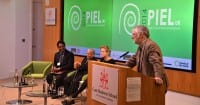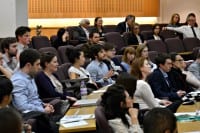Public Interest Environmental Law (PIEL) UK 8th Annual Conference 2014
By Rob Amos, on 29 April 2014
 On Friday 11 April 2014, the Public Interest Environmental Law (PIEL) UK 8th Annual Conference was held at Cass Business School, City University London. This year’s event was organised by a committee of environmental law students from UCL, SOAS, City University London and Birkbeck, and drew around 150 attendees including academics, practitioners, NGO representatives and students. It was also generously supported by UCL, City University London, LSE, Hausfeld & Co LLP, Green Dragons, and Friends of the Earth.
On Friday 11 April 2014, the Public Interest Environmental Law (PIEL) UK 8th Annual Conference was held at Cass Business School, City University London. This year’s event was organised by a committee of environmental law students from UCL, SOAS, City University London and Birkbeck, and drew around 150 attendees including academics, practitioners, NGO representatives and students. It was also generously supported by UCL, City University London, LSE, Hausfeld & Co LLP, Green Dragons, and Friends of the Earth.
With the overarching theme as “Corporations’ Role in the Environmental Crisis: Problem or Solution?” the day was crammed full of enthusiasm from our Chair, Professor William Howarth (Kent Law School), speakers and attendees to engage with the question and its many facets.
The tone was set with the morning’s first panel session with Tim Edwards (International Campaign for Justice in Bhopal), Elspeth Owens (ClientEarth) and Dr Carrie Bradshaw (University of York Law School) exploring the anatomy of a corporation from campaign group, practitioner and academic perspectives. Fascinating case studies were presented on the fashion and pharmaceutical industries by Ilze Smit (Greenpeace) and Dr Nipul Somathilaka (Weeramantry International Centre for Peace Education and Research), illustrating the “unseen” effects that the manufacture of everyday products can have on the environment. Sharon Turner (ClientEarth) discussed the need for a dedicated environmental NGO in environmental protection to counterweight corporate power. Dr David Collins (City University London) spoke on the impact of international trade on the environment and the unlikelihood of “greening” the WTO. Enforcement issues were considered with both gravity and moments of humour from the panel session with Shruti Suresh (Environmental Investigations Agency), Sailesh Mehta (Red Lion Chambers) and Professor Richard Macrory (UCL). The role of scientific expertise in shaping decisions affecting GMOs and emissions trading was also respectively discussed by Elizabeth Waigmann (EFSA GMO Unit) and Dr John Broderick (The University of Manchester Tyndall Centre for Climate Change Research).
 The keynote speaker was Judge C.G. Weeramantry, former Vice-President of the International Court of Justice. His deliberations on the the teachings of the world’s great religions advocating that humanity must learn to live in harmony with nature, rather than continue with exploitation for short term gain, if environmental disaster is to be forestalled, clearly struck a note with many attendees and provoked lively discussions on the according roles of corporations and lawyers.
The keynote speaker was Judge C.G. Weeramantry, former Vice-President of the International Court of Justice. His deliberations on the the teachings of the world’s great religions advocating that humanity must learn to live in harmony with nature, rather than continue with exploitation for short term gain, if environmental disaster is to be forestalled, clearly struck a note with many attendees and provoked lively discussions on the according roles of corporations and lawyers.
By providing an accessible forum for discussion and debate, the PIEL UK Conference allows a diverse range of practitioners, academics and members of the public to engage with environmental problems and to encourage solutions. While corporations have tremendous influence in creating and providing potential solutions to environmental harm, they are not the only actors. The role of the public is also crucial.
Video recordings of the conference are available here.
Judge Weeramantry’s address at the conference received a lengthy report in the Sri Lankan Sunday Times. The report is available here.
 Close
Close


